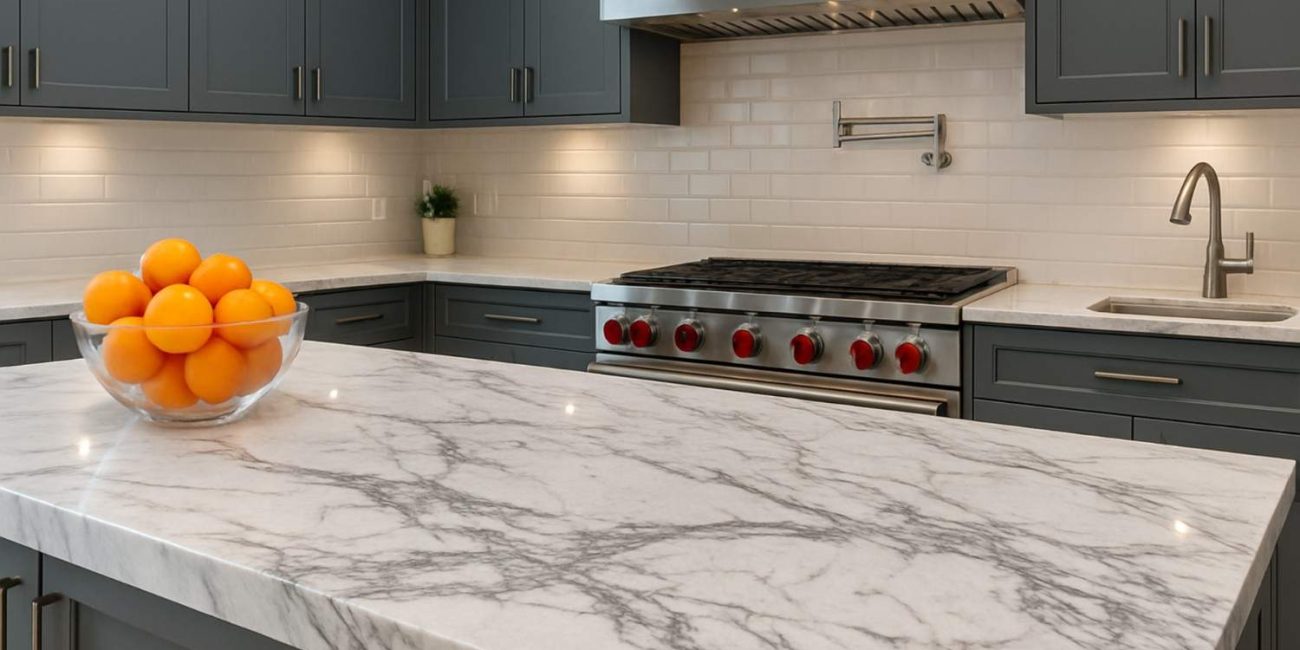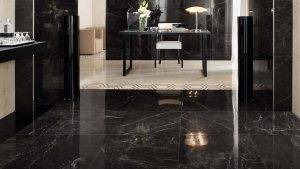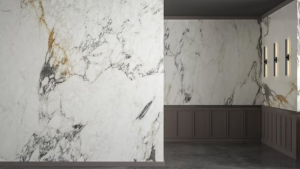Picking the right countertop for your kitchen can be a tough decision. With so many materials available, it’s important to find one that suits your lifestyle, cooking habits, and home style. Among all the options, stone countertops like quartz, granite, and marble—remain the most popular for their beauty and strength.
Understanding Different Stone Countertops
Let’s explore the three top choices in detail:
Quartz Countertops
Quartz is a man-made material created by blending natural quartz with resins and colourants. Quartz countertops are a great choice for homeowners seeking both beauty and practicality in their kitchen or bathroom.
Benefits of Quartz:
- Non-porous: resists stains from coffee, wine, and oil.
- Easy to clean: just use soap and water.
- Comes in many colours and patterns.
- No sealing needed after the quartz countertops installation.
Ideal for: Busy families and modern kitchens.
Granite Countertops
Granite is a natural stone formed from cooled magma, making it one of the strongest and most reliable materials for kitchen surfaces. Granite countertops offer both timeless beauty and lasting durability, perfect for various home styles.
Benefits of Granite:
- Very durable and scratch-resistant.
- Can handle hot pans with ease.
- Unique patterns—each slab is one-of-a-kind.
- Works well indoors and outdoors.
Ideal for: Traditional kitchens, luxury spaces, outdoor areas.
Marble Countertops
Marble is a natural stone formed from limestone and is celebrated for its classic, elegant appearance. Marble countertops are a popular choice in high-end kitchens and baking stations for their timeless charm and natural beauty.
Benefits of Marble:
- Soft and cool surface—great for baking.
- Timeless design and beauty.
- Adds value to high-end homes.
Things to Keep in Mind:
- Porous and may stain if not sealed regularly.
- Softer, so more prone to scratches.
Ideal for: Stylish kitchens, low-traffic areas, baking enthusiasts.
Key Factors to Consider When Choosing a Stone
Durability and Daily Use
| Material | Durability | Best For |
| Quartz | High | Daily cooking |
| Granite | Very High | Heavy kitchen use |
| Marble | Medium | Occasional baking |
- Marble is beautiful but needs more care.
Maintenance and Cleaning
- Quartz: Low maintenance, just wipe and go.
- Granite: Needs sealing once a year.
- Marble: Needs more care and sealing more often.
Pro Tip: Use pH-neutral cleaners to avoid damaging the surface.
Looks and Design
- Quartz gives you many choices in colour and texture.
- Granite offers natural, earthy patterns.
- Marble stands out for its soft veining and classic look.
Your choice should match your kitchen cabinets, flooring, and overall home design.
Heat and Stain Resistance
| Material | Heat Resistance | Stain Resistance | Needs Sealing |
| Quartz | Moderate | High | No |
| Granite | Excellent | Medium | Yes (yearly) |
| Marble | Moderate | Low | Yes (often) |
Use trivets on quartz and marble surfaces. Granite can handle direct heat, but sealing helps protect it from stains.
Which Stone is Right for You?
- For Families with Kids: Quartz is the best option. It is durable, non-porous, and resists stains from juice, sauces, and crayons.
- For Cooks and Bakers: Marble is the top choice for baking lovers. Its naturally cool surface is ideal for kneading dough and making pastries. It also adds a touch of elegance to kitchens, but it does need careful handling and regular sealing.
- For Outdoor Kitchens: Granite is highly recommended. It can withstand extreme weather conditions, including intense heat and heavy rain. Its strength and natural look make it perfect for patios, barbeque areas, and garden counters.
- For Busy Professionals: Both Quartz and Granite are great choices. They require very little maintenance and offer long-lasting performance. Quartz works well for modern minimalist kitchens, while granite adds a bold natural touch with its unique patterns.
Professional Installation Tips
- Always hire a skilled installer, especially for marble.
- Check that they seal granite and marble properly.
- Confirm that they level the surface before placement.
- Ask about after-care instructions.
Proper marble countertops installation ensures a flawless finish and helps preserve the stone’s elegance over time.
Conclusion
Choosing the right stone for your kitchen countertop is not a one-size-fits-all decision. It depends on your lifestyle, budget and design preferences. If you want a modern look with low maintenance, quartz is a smart choice. For those who need something strong and suitable for outdoor use, granite is a great option. If you value elegance and enjoy baking, marble brings timeless beauty to your space. By carefully considering factors like durability, upkeep, cost, and appearance, you can confidently select the stone that best suits your kitchen and enhances both its style and function.
Frequently Asked Questions
How often should I seal marble floors in humid areas?
Sealing every 6 to 12 months is recommended, based on how much moisture and foot traffic the surface gets.
Can I use vinegar to clean marble?
Vinegar’s high acidity can be harmful to the surface, so it’s best not to use it. Use a gentle cleaner made specifically for marble.
What’s the best way to prevent humidity damage?
Keep the surface dry, maintain good airflow indoors, and seal the marble regularly to protect it from moisture.
Should I polish marble floors myself?
Light polishing at home is fine, but for restoring shine or removing marks, professional help is a better option.
Where can I find trusted marble suppliers in the UAE or Saudi Arabia?
Look for reliable marble companies with quality products and expert guidance for humid regions.






